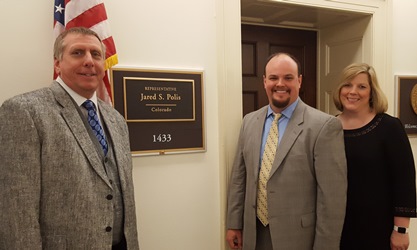NASFAA Members Take to the Hill to Discuss DACA, Federal Budget Concerns
By Brittany Hackett, Communications Staff
 The future of undocumented students, concerns over the federal budget, and simplification were the focus of several Capitol Hill meetings NASFAA members participated in on Tuesday during an event for our Advocacy Pipeline.
The future of undocumented students, concerns over the federal budget, and simplification were the focus of several Capitol Hill meetings NASFAA members participated in on Tuesday during an event for our Advocacy Pipeline.
Kennesaw State University Associate Director of Financial Aid Sarah Baumhoff, University of Northern Colorado Associate Director of Financial Aid James Broscheit, and Colorado State University Associate Director of Operations Joe Donlay attended the event.
While discussing financial aid policy issues with congressional staff from Colorado offices, Broscheit and Donlay emphasized concerns they have about the future of undocumented students who are attending college through the Deferred Action for Childhood Arrivals (DACA) program, an executive program started by the Obama administration in 2012 that President-elect Donald J. Trump has threatened to overturn. Colorado, in recent years, has been active at the state level in assisting undocumented students in attending and paying for college, and there are concerns at many higher education institutions in the state about the future of those students if DACA were to go away or other immigration-related policies were put into place by the Trump administration.
 It is difficult to know what will happen regarding DACA and immigration in general after Trump takes office, and several cities and campuses around the country have committed to being “sanctuary campuses” for undocumented students, pledging to support those who may face deportation. In the face of such uncertainty, Donlay said, “any opportunity our [undocumented] students have to tell their story and have an ally is priceless.”
It is difficult to know what will happen regarding DACA and immigration in general after Trump takes office, and several cities and campuses around the country have committed to being “sanctuary campuses” for undocumented students, pledging to support those who may face deportation. In the face of such uncertainty, Donlay said, “any opportunity our [undocumented] students have to tell their story and have an ally is priceless.”
The advocacy pipeline participants also discussed the impact the federal budget has on funding for federal student aid programs, particularly the Pell Grant Program, Federal Work-Study, and the Supplemental Educational Opportunity Grant (SEOG). With the roll out of Early FAFSA, an on-time budget from Congress is even more necessary in order for aid offices to give students accurate financial aid awards, they told congressional staff.
And finally, the need to simplify the financial aid system and accompanying regulations in a way that makes it easier for students and families to navigate, and for aid administrators to work with, was brought up in meetings with Hill staff. In particular, the NASFAA members discussed the need to reduce the number of repayment plans available to student loan borrowers, codifying the use of prior-prior year income information, reforming the Return to Title IV (R2T4) process, and re-instating the year-round Pell Grant.
The goal, Baumhoff said, is to give financial aid administrators more flexibility to serve students and reduce the regulatory burden of financial aid offices so they can better counsel families. “Any time we get a little bit of flexibility to do what is best for our student population it is appreciated,” she said.
For more pictures from the event, check out NASFAA's Advocacy Pipeline Facebook album. If you're interested in volunteering to be a part of NASFAA's Advocacy Pipeline, fill out an interest form here.
Publication Date: 12/7/2016




